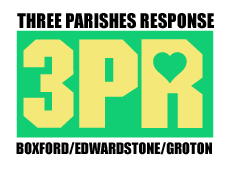COMMUNITY FIRST RESPONDERS
3PR - THE THREE PARISHES RESPONSE TEAM
BOXFORD / EDWARDSTONE / GROTON

FAQs
What is a First Responder?
A First Responder is a trained individual who attends a potentially life-threatening emergency and provides immediate care, such as cardiopulmonary resuscitation (CPR) and defibrillation, until further medical help arrives.
Who is a Community First Responder?
A Community First Responder (CFR) is a trained volunteer who responds on behalf of the East of England Ambulance Service NHS Trust to certain 999 emergency calls in their local area. CFRs provide early assessment and emergency care in the crucial minutes before an ambulance arrives.
Why do we need Community First Responders?
In medical emergencies such as cardiac arrest, early intervention can be critical. The concept known as the ‘Chain of Survival’ highlights the importance of early recognition, early CPR and early defibrillation in improving patient outcomes.

- Early recognition and calling for help
- Early CPR
- Early defibrillation
- Early advanced care
Community First Responders provide an important link in this chain, particularly in rural or semi-rural areas, by delivering early care while an ambulance is on its way.
Do Community First Responders replace ambulances?
No. Community First Responders support the ambulance service but do not replace it. An ambulance response is always dispatched, and CFRs provide early care until professional ambulance staff arrive.
What type of incidents are Community First Responders sent to?
CFRs are dispatched to specific types of emergency calls, typically those that are life-threatening and where early intervention may benefit the patient. The exact incidents attended are determined by ambulance control and may vary.
What training do Community First Responders receive?
All Community First Responders receive structured training provided or approved by the East of England Ambulance Service NHS Trust. This includes life-saving skills such as CPR, use of an automated external defibrillator (AED), patient assessment and emergency care.
Training is ongoing, with regular refresher sessions and assessments to ensure responders maintain high standards of care.
Will I be paid for being on call or attending incidents?
No. The role of a Community First Responder is voluntary and unpaid.
How do I get to an incident?
Responders must hold a full UK driving licence and have access to a reliable car when on duty.
Will it affect my car insurance?
Most insurance providers do not charge extra for voluntary Community First Responder duties, although this can vary. The ambulance service can provide confirmation of your role if required by your insurer.
Are Community First Responders exempt from driving laws?
No. Community First Responders do not use blue lights or sirens and must comply fully with the Highway Code at all times.
Who is responsible for Community First Responders?
When dispatched to an incident by ambulance control, Community First Responders act on behalf of the East of England Ambulance Service NHS Trust and are expected to adhere to appropriate standards of conduct. At all other times, they are responsible for their own actions.